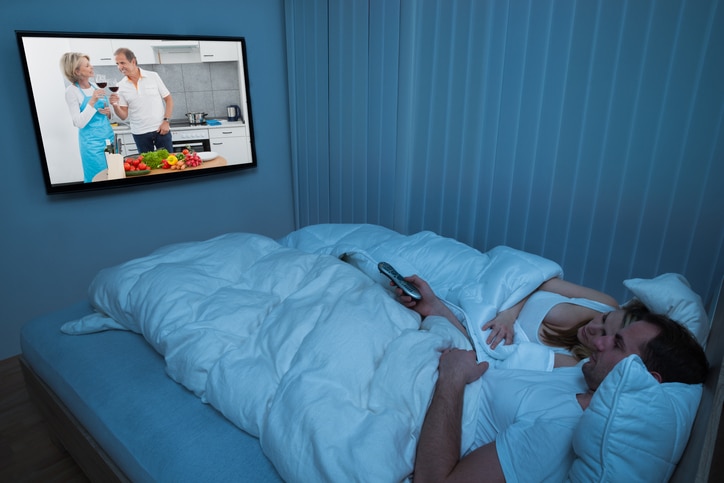Before bed, be sure to draw the curtains, turn off all the lights, and don’t leave the TV on.
That’s the advice from a new study out of Northwestern University showing that even a small amount of light at night can harm your heart health and increase your insulin resistance.[1]
Dr. Phyllis Zee led the study. “Just a single night of exposure to moderate room light during sleep can impair glucose and cardiovascular regulation, which are risk factors for heart disease, diabetes, and metabolic syndrome,” she said.
“It’s important for people to avoid or minimize the amount of light exposure during sleep.”[2]
Lights at Night Keep Your Heart Beating Fast
Surveys have found that about 40% of people sleep with a light or television on in their bedroom, Dr. Zee noted.
The Northwestern study found that when you sleep in a room with lights, your heart doesn’t slow down as much as it should. That means your body can’t rest properly. This, in turn, damages your heart function and increases blood sugar.[3]
The study tested the effects of sleeping with moderate light (100 lux) compared to dim light (3 lux). The researchers discovered that moderate light caused subjects’ bodies to go into a higher alert state, with an increased heart rate.
When they awoke, the study subjects were unaware that their heart rate had been higher during the night. “But the brain senses it,” said Dr. Daniela Grimaldi, a co-author of the study. “It acts like the brain of somebody whose sleep is light and fragmented. The sleep physiology is not resting the way it is supposed to.”
3 Ways to Reduce Your Nighttime Light Exposure
Dr. Zee’s first recommendation is the obvious one: Turn off the lights and TV in your bedroom before you try to sleep.
She also suggests:
- If you need a light (which seniors may want for safety), make it a dim light close to the floor. You may also consider a motion-detecting night light that turns on only when you get out of bed.
- Redder is better. Amber or a red/orange light is less stimulating. If you have an illuminated nightstand clock, go with a model that has a red display. If you use a night-light, consider models that use red light. Stay away from white or blue light.
- If you can’t control the outside lights shining into your bedroom window… Consider blackout shades or a sleep mask.
There’s a simple rule to determine if your bedroom is too light, Dr. Zee said. If you can see well enough to move around without bumping into things, it’s probably too light.
Related Articles
How Energy-Saving Lights Wreck Your Health
Sleep This Way to Relieve Chronic Pain
Sleeping Pills: The Hidden Danger for Seniors
References
[1] https://www.pnas.org/doi/full/10.1073/pnas.2113290119
[2] https://medicalxpress.com/news/2022-03-moderate-exposure-heart-health-insulin.html
[3] https://www.pnas.org/doi/10.1073/pnas.2113290119

